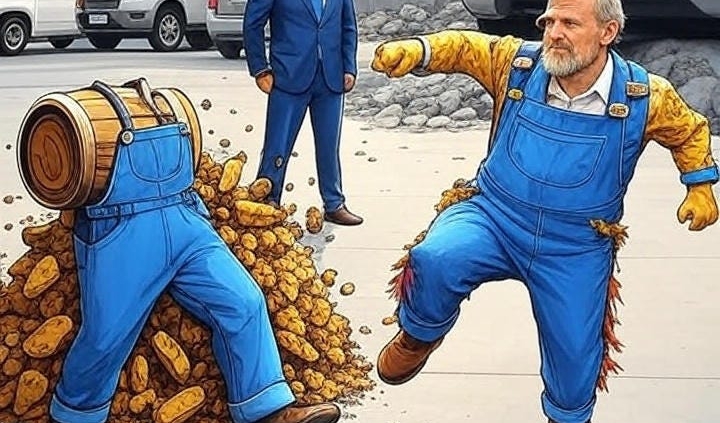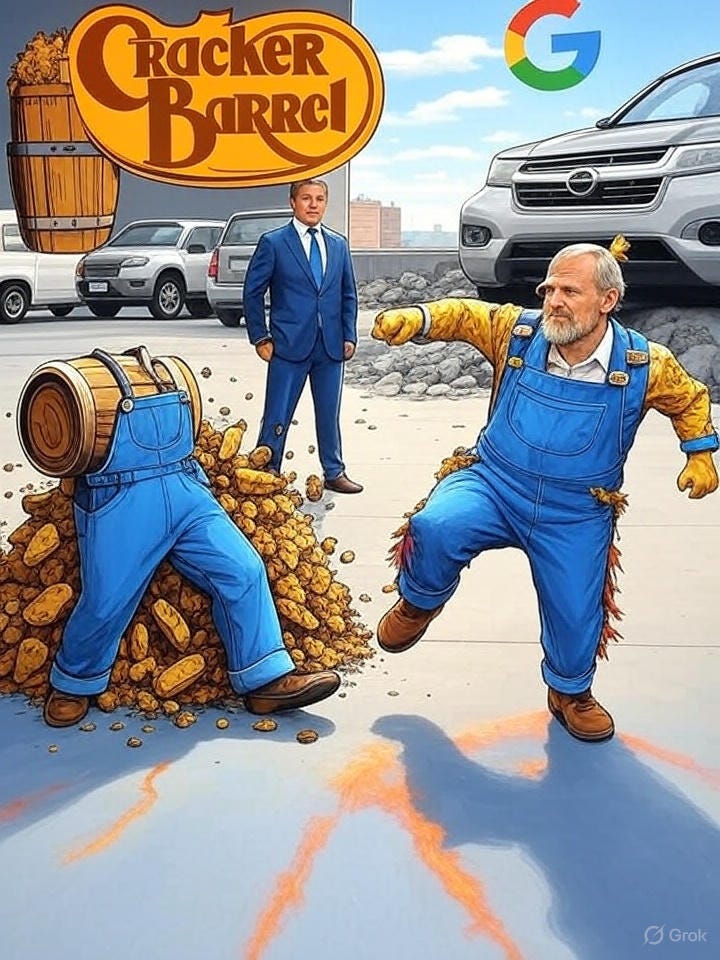Fear Of Branding
Image from Grok (where there is no fear
Brands are among capitalism’s most ingenious inventions: intangible assets that conjure premium cash flows in competitive markets. They endure longer (fostering loyalty through recognition and trust), command higher margins (as consumers pay up for that reliability), and weather volatility (loyal fans don’t bail during downturns). At their core, brands embody subjective value—the economic lifeblood where my devotion to an Apple iPhone coexists happily with your allegiance to a Google Pixel, amplifying overall prosperity.
Different and better
This magic hinges on differentiation. Brands stake claims, positioning themselves as superior in specific ways, even if it means alienating non-believers. They court controversy through critique—think Pepsi mocking Coke’s heritage or Burger King trolling McDonald’s consistency. The payoff? A devoted niche that evangelizes, drawing in converts via word-of-mouth. Strong brands aren’t milquetoast; they’re bold, unapologetic declarations: “We’re for you, not them.” As the adage goes, they must stand for something—or risk standing for nothing.
Corporate bureaucrats are not brand-builders
Enter Cracker Barrel, a chain whose recent rebrand exemplifies the epidemic of “fear of branding.” Rooted in Americana, the original concept evoked the humble cracker barrel—a 19th-century staple for shipping soda crackers, symbolizing protection, community, and simplicity. At country stores, the cracker barrel doubled as a social hub for gossip, checkers, and neighborly bonds. Cracker Barrel’s branding channeled this: a logo featuring the barrel, an “old-timer” in overalls lounging on a rocker, and the tag “Old Country Store.” Interiors brimmed with eclectic knick-knacks, walls alive with vintage ads and tools. It wasn’t for everyone—it targeted those craving nostalgic wholesomeness, unironically embracing rural charm in a fast-paced world.
But new leadership, eyeing “long-term trends,” deemed this too polarizing. They axed the barrel, the old-timer, and much of the folksy decor, opting for a sanitized, “inclusive” aesthetic critics dubbed “corporate blandness.” Menu tweaks followed, diluting signature comfort foods. The backlash was swift: loyalists flooded social media with laments, decrying the loss of soul. Sales dipped, and the chain’s stock tumbled, underscoring a harsh truth—differentiation isn’t optional; it’s the brand’s oxygen.
Cultural rot
This isn’t isolated cowardice; it’s a cultural rot infiltrating marketing. Fast-food chains churn identical price-war ads, shunning flavor showdowns like the old Wendy’s “Where’s the Beef?” campaigns. Tech giants fare no better: Google’s search is pitched as universal utility, not a rebellious disruptor; AWS markets as a commoditized cloud, ignoring its e-commerce revolution roots. Even automotive titans blur lines—tell me, what’s the real distinction between a Honda Pilot, Toyota Highlander, or Ford Explorer beyond badges? They’re all “family-friendly SUVs,” a euphemism for safe sameness.
Why this retreat? Blame a toxic brew of bureaucracy and risk-aversion. In boardrooms, compliance trumps creativity; algorithms favor “broad appeal” over bold edges. Social media amplifies outrage, turning differentiation into a liability—why risk a Twitter storm when vanilla vanishes into the feed? Yet this fear is self-defeating. History’s icons—Nike’s “Just Do It” defiance, Harley-Davidson’s outlaw ethos, Red Bull’s extreme-sports audacity—thrived by polarizing. They didn’t chase universality; they built tribes.
Society suffers when brands cower. We need provocateurs to spark innovation, challenge norms, and fuel progress. As Apple’s legendary “Think Different” campaign urged, honoring misfits and rebels drives change. Marketers, reclaim your spine: overcome your fear of branding, or watch your creations fade into irrelevance. The market rewards the brave, not the bland.
______________________________________________________________
Brand uniqueness emerges from entrepreneurial intelligence. Our brand uniqueness blueprint is included in The Value Creators online business course.

